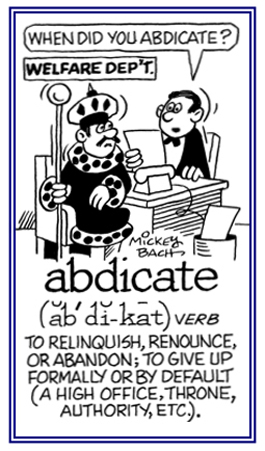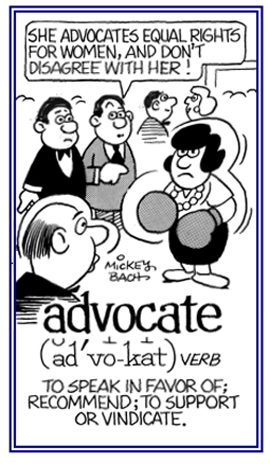-cate
(This suffix has no etymological source; it is just a part of other words.)
A king can abdicate, renounce, or swear away his kingly privileges and duties.
2. To refuse to accept an obligation or responsibility: When Sharon was told to revise her book, as instructed by her editor, she suddenly abdicated her contract with the publisher because she didn't agree with the new format.3. To proclaim or declare to be no longer one's own, to disclaim, disown, cast off, especially to disown or disinherit children: Gary Brown abdicated his responsibilities as a husband and father and never returned to be with his wife and children again.
4. To give up a right, trust, office, or dignity; to leave, to lay down, to surrender, to abandon; at first implying voluntary renunciation, but now including the idea of abandonment by default: Governments, both national and local, seem to be abdicating their responsibilities to provide a good education for all of their citizens by greatly reducing the financial expenditures that are needed.
Tom abdicated his responsibilities as a salesman and left town to look for another place to live.
5. To leave one's position, office, or power: Yielding to the pressure of public opinion, the president of the country is abdicating his political authority.
The outraged citizens forced the talk-show host to abdicate his radio program.
6. Etymology: from Latin ab-, "away" + dicare, "to proclaim". When people abdicate their positions, they "proclaim away" their authorities.
Go to this Word A Day Revisited Index
so you can see more of Mickey Bach's cartoons.
2. Not doing that which is required of a person or a group of people: The banking officials were accused of trying to abrogate their duties.
Some U.S. Presidents have decided to arrogate the power of congress to declare war.
2. To assign or to attribute to another person without justification: Neil accused the woman next door of wanting to arrogate to herself the power to punish people.2. To say or to suggest that someone, or something, is not worthy of respect or is not important: There were times when the man's wife would derogate him for not achieving better pay from his company.
A delegate is someone who is sent with authority to represent another or others; to delegate work or authority is to transfer or to send it to another person.
2. Easily damaged, spoiled, fragile, frail, perishable; dainty: The plate was so delicate that Sarah was afraid to wash it for fear of breaking it.
3. Frail, feeble, debilitated, weakened; infirm, unwell, sickly, ailing: Marie and Jamie were concerned about their little girl's delicate condition.
4. Palatable, savory, delicious, appetizing, luscious: Debra, the hostess, presented a tray of delicate food to her guests.
5. Soft, muted, subdued: Ted and Cheryl had the walls of their apartment painted with a delicate blue color.
6. Exquisite, minute, detailed: Clyde and Donna admired the delicate workmanship on the bronze doors.
7. Tactful, tasteful, diplomatic, careful, sensitive, refined: Jessie Brown, the public relations manager, handled the situation in a delicate manner.
The female senator decided to leave her senatorial seat after she abrogated a decision that would arrogate her right to become a delegate of a congressional committee when a political opponent felt the need to derogate her because of her delicate physical condition.
2. To make an official judgement about a problem or a dispute in a law case: The two families were constantly arguing about the fence along their property lines causing them to go to court. The judge adjudicated the conflict and ordered the fence to be taken down.
3. Etymology: from Latin ad-, "to" + judicare, "to judge".
2. People who plead in behalf or others or who are intercessors: Tina's parents have been advocates for abused children and spouses in a variety of media and social movements.
3. An individual with legal training who supports or intercedes for other people: The advocate who Jane hired to plead her case in the traffic court was successful and so she didn't have to pay a large fine.




Go to this Word A Day Revisited Index
so you can see more of Mickey Bach's cartoons.
2. To distribute something according to a plan: The government agency announced a plan to allocate millions of dollars to purchase food supplies and medications for the storm-hit community.

Go to this Word A Day Revisited Index
for a list of additional Mickey Bach illustrations.
2. Disagreeing about something: Greg’s parents were altercating about when it would be best to go on vacation, before or after Christmas.

Go to this Word A Day Revisited Index
so you can see more of Mickey Bach's cartoons.
2. To give a favorable turn when starting something; to inaugurate in a sense derived from the historical practice of observing birds in flight, before undertaking an important decision or action: The leaders of Rome usually auspicated their public activities before proceeding with them.
Before he could pick up his package at the post office, Jeffery had to authenticate that he was the authorized person by showing his driver’s license.
2. To prove something to be genuine; especially, some artistic piece of work: The insurance company wanted Linda to have her violin's condition authenticated by a violin expert so it could be insured in case of theft, fire, etc.2. To split or to separate into two parts or directions: As Jane was driving through the forest, the road she was driving on suddenly bifurcated and she noticed that if she were to go to the right, it would take her up the hill; however, if she were to turn to the left, she would be going down the hill

This particular illustration from Google images provides an example of bifurcating a symbol on a sign so it shows drivers on a highway that the road will be splitting into two directions.
2. To put words in a certain order or to arrange words naturally together : The word "college" collocates with "student" or "college student"; "quick" collocates with "temper"; however, "fast" does not collocate with "temper".
2. To express thoughts, feelings, or information easily or effectively: The doctor was able to communicate the significant medical information to his patient.

